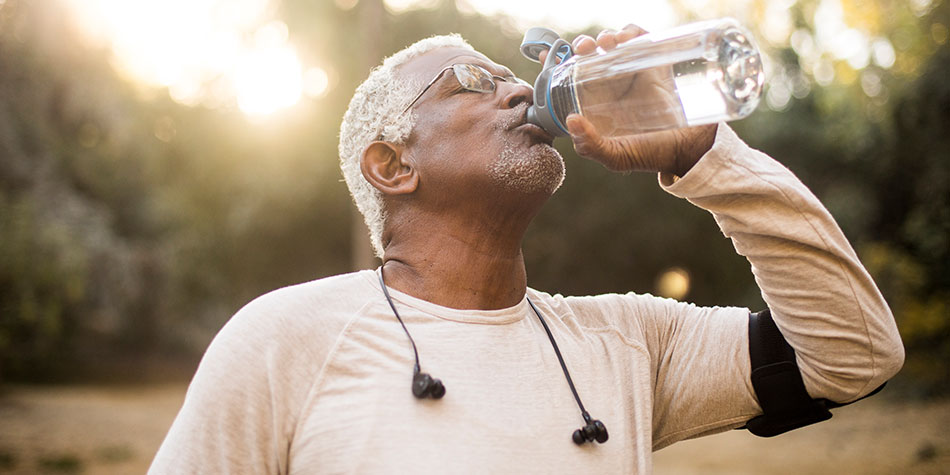
You probably know winter weather can pose serious risks for your heart, but what about the summer? Hot, humid days can spell trouble, too, especially if you already have heart problems. In general, very high heat is not good for anyone, but it is much worse for people who have heart diseases.
Follow these tips to protect your ticker when the temperatures soar.
Monitor Your Medicines
If you take heart medication, talk with your doctor before spending extra time in the heat. Certain prescription medicines, like ace inhibitors, beta blockers and calcium channel blockers, can intensify your body’s reaction to hot temperatures and humidity.
Be mindful, too, of diuretics, which are often used to treat high blood pressure. These reduce sodium and water in the body, in addition to what you may be losing through sweat on hot days. Don’t stop taking your medication, though: Stay cool indoors and follow your doctor's advice.
Stay Hydrated
Drinking fluids helps prevent dehydration and overheating, which make your heart work harder. Plus, your body has to release more hormones to retain salt and water, which stresses the heart even more. Drink 2 to 4 cups of water every hour when you're out in high heat.
If you’re doing intense exercise, try a sports drink to replenish sodium and potassium. Avoid sugary drinks like fruit juice, which slow the absorption of water. Caffeine and alcohol can also deplete fluids, so if you're having margaritas by the beach, have a glass of water, too. One caution: Patients with congestive heart failure should check with their doctor, as drinking too much can do more harm than good.
Dress Appropriately
If you have to spend a lot of time outdoors, make sure your outfit is cool and breathable. Wear lightweight, light-colored clothing, made of cotton. There are even some synthetic fabrics now that can repel sweat. Don’t forget sunglasses, a broad-brimmed hat and well-ventilated shoes.
Exercise With Caution
Steer clear of the steamiest times of day. Typically, it's the hottest in the afternoon, around three or four o’clock, and seek shade from 10 a.m. to 2 p.m., when the sun's rays are the strongest.
If it’s very hot outside or you’re starting a new workout, gradually increase the length and intensity of your exercise over time, rather than pushing yourself too hard. Limit outdoor workouts to no more than 90 minutes and take frequent breaks to hydrate and cool off. You can even hold frozen water bottles to stay cool while you work out—as the ice melts, drink up.
Eat Smaller Meals
Noshing on lighter, water-packed meals and snacks—think salads, smoothies, cold soups and fruit—can help prevent dehydration. Small meals will also help keep your heart rate steady, and foods with a high-water content will help ensure your body temperature stays low.
Cool Off Quickly
When the temperature climbs, it's important to know when you've had too much. Muscle cramps, weakness or heavy sweating can all be signs of heat exhaustion. Get inside, take a cool shower or bath or use cold compresses. Putting ice packs in the armpits, groin area or neck region also helps, since those are places where the major blood vessels are.
Call 911 immediately if you have chest pains, or if you have signs of heat stroke, including a high fever, dizziness or confusion, a pounding heart or hot, red, dry or moist skin.